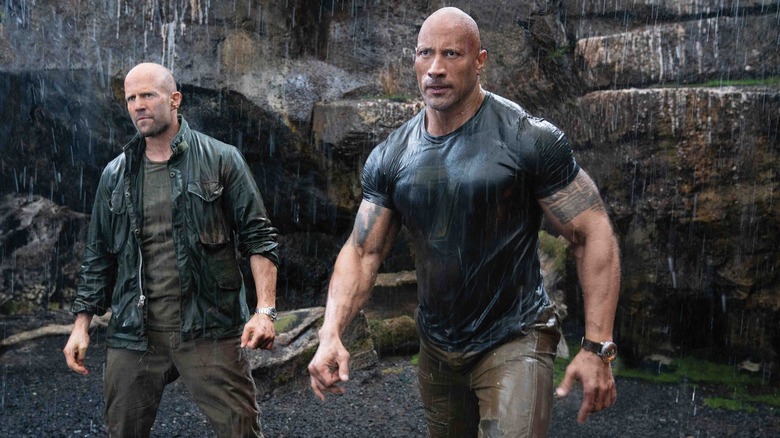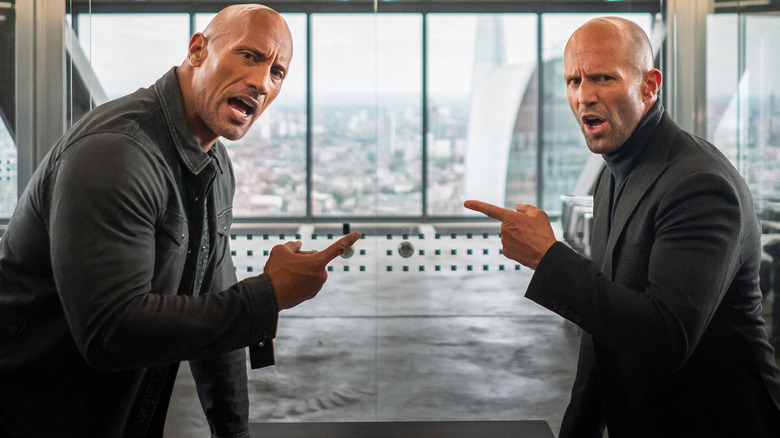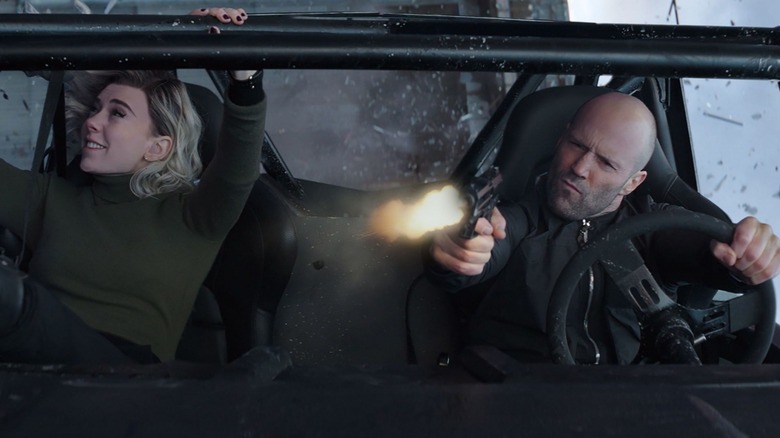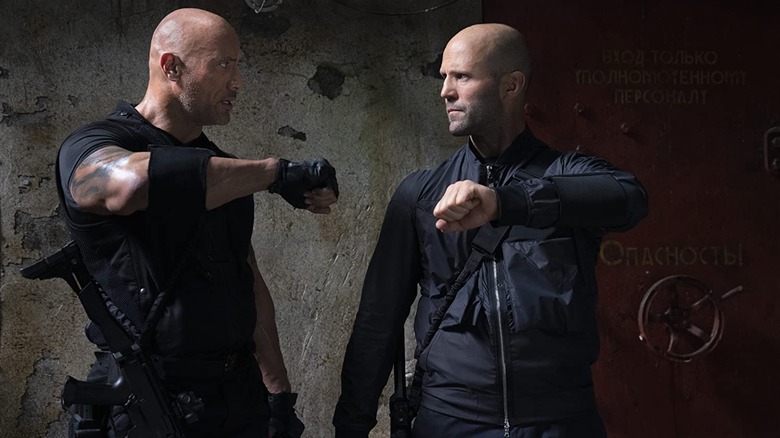The Worst Fast And Furious Movie Taught Us An Important Lesson About The Franchise
2017 was a time of great tumult in the world of "Fast & Furious." Paul Walker's shocking death part-way through shooting on "Furious 7" had left many fans conflicted about the franchise continuing, especially after the movie's tear-jerking ending/tribute to the late actor. Then there was the brouhaha that was the Candy Ass incident unfolding behind the scenes, with Dwayne Johnson and Vin Diesel on the precipice of recreating Dom and Hobbs' sweaty "Fast Five" brawl in real-life. It appeared that even The Fast Saga was no longer big enough to contain these two chrome-domed mega-stars in tight-fitting T-shirts. But what to do about it? Turn the next entry into the backdoor pilot for a Johnson-led spinoff, of course!
That's how 2017's "The Fate of the Furious" plays, anyway. The main thrust of the plot involves cunning cyber-terrorist Cipher (Charlize Theron) and her white-lady dreadlocks blackmailing Dom (Diesel) into doing her evil bidding, yet the film frequently shifts away from that to focus in on Johnson's ex-Diplomatic Security Service agent. This is also where we get multiple scenes of Hobbs sparring verbally with Jason Statham's Deckard Shaw, the likes of which supposedly inspired the idea to spin the duo off into their own film.
Watching Hobbs and Shaw trash-talk one another is fun, although their scenes clash with the one-on-ones between Cipher and Dom (wherein Diesel is quite sincerely going for that Oscar). Then there's the movie's ill-conceived approach to evolving Shaw from villain to antihero, which would ultimately inspire the "Justice for Han" fan campaign. That's on top of its strained efforts to transform Hobbs from a character clearly never intended to be a lead into just that. Sadly, the ensuing "Hobbs & Shaw" would only go on to compound these issues, in the process teaching us a valuable lesson about what, precisely, keeps this franchise chugging along (y'know, besides NOS).
Too much of a good thing
Lest anyone accuse me of trying to rewrite history, let's clear up a few things. "Fast & Furious Presents: Hobbs & Shaw," to use its full title, was certainly a financial hit and its reviews were respectable, if lukewarm. Earlier "Fast & Furious" movies had absolutely garnered a much less favorable response from critics, yet most of them are seemingly remembered more fondly by "Fast" fans nowadays than "Hobbs & Shaw." But why?
The issue with "Hobbs & Shaw" isn't the setup. Movies about two bickering guys teaming up to solve a crime or save the world may've peaked in popularity back in the 20th century, but the likes of Shane Black's "The Nice Guys" proves the formula can still work like gangbusters. The thing is, these movies also live or die based on the dynamic between their characters — not just how they interact, but also how they push one another to evolve as people. It's why the original "Fast and the Furious" resonated with audiences. Yes, it's a blatant "Point Break" knockoff, but the ways its leads challenge each other — combined with the fiery chemistry between Dom and Letty Brian — give it a beating heart.
In "Hobbs & Shaw," however, there's no real sense of growing connection or even begrudging admiration between the titular duo. They lob insults back and forth in between trying to show one another up and then ... they do it all over again. And again. When they finally learn to fight in harmony in the movie's climax, it's not actually clear how they got to that point, beyond being what the plot dictated. Hobbs and Shaw's shtick works fine when they're supporting players — but as the main characters? It's (way) too much of a good thing.
It's all about family... or something
The "Fast & Furious" movies weren't always strictly about family ... or, more accurately, people repeating the word "family" ad infinitum. But themes of brotherhood and finding your tribe across the divides of culture and race (or simply making everyone Latino by default) have always been at the heart of the property.
"Hobbs & Shaw" tries but struggles to uphold this tradition. The absurdity of Vanessa Kirby — herself nearly 21 years younger than Jason Statham — playing Deckard's sister Hattie (who is implied to be near the same age as him) is par for the course for a franchise where characters use car windshields to break their fall. What's less forgivable, though, is the lack of interest the film shows in actually establishing their rapport outside of some brief flashbacks to the various schemes they pulled off as children. Instead, much of the movie's runtime is dedicated to Hobbs and Deckard's repetitive squabbles, themselves as homoerotic as they are brotherly (which is, admittedly, faithful to the "Fast" ethos).
Eventually, the third act brings this family motif to the forefront by having Hobbs and friends travel to Samoa, allowing Hobbs to hash things out with his estranged brother Jonah (Cliff Curtis). As with Hattie and Deckard, though, you don't get a sense of how Hobbs and Jonah relate to one another outside of when they're fighting or reconnecting. Moreover, the other members of the Hobbs clan are barely sketched at all and feel like an afterthought once the action kicks in, sadly undoing what seems like a sincere move on Dwayne Johnson's part to honor his Samoan heritage. That the movie also punts a scene where Hobbs' daughter finally meets her extended family to the credits just goes to show where its true priorities lie.
Earnestness wins over snark
"Fast & Furious," as a franchise, has long prided itself on just how seriously it takes its soapy storylines and character dynamics without being overly self-serious as a whole. In an era when so many superhero movies are snark-fests and tentpoles are rife with meta-humor, the central "Fast" movies refuse to crack wise. The closest they've come so far was Roman (Tyrese Gibson) marveling at the "Fast" Fam's apparent invincibility in "F9" — and even that thread culminated in Roman delivering a heartfelt speech (in outer space, no less).
This is part of what makes "Hobbs & Shaw" director David Leitch an unwieldy addition to the property. As a longtime stunt performer/coordinator who made his uncredited co-directing debut on "John Wick," Leitch knows his way around an action scene and that serves the spinoff well. However, his specialty is action-comedies about antiheroes constantly quipping in between fighting the bad guys, like "Deadpool 2" and "Bullet Train." That's very different from "Fast & Furious," a movie series where the characters always take the situations they're in at face value, outlandish as they tend to be. (That and Leitch's cooler visual style doesn't fit the aesthetic of one of the sunniest and generally well-lit tentpole properties in Hollywood.)
Leitch, to his credit, tempers his acerbic tendencies for "Hobbs & Shaw," yet it still ends up being easily the sassiest "Fast & Furious" movie ever. Put simply, the central entries in the series work because they refuse to indulge in irony and are as emotionally naked as blockbusters come in their dramatic moments. It's a very subtle and precise alchemy, being wholesomely earnest and utterly ridiculous at the same time — and without the necessary core character relationships, "Hobbs & Shaw" is just too darn cheeky, to its downfall.
"Fast X" charges into theaters on May 19, 2023.



